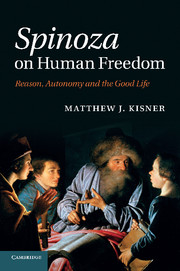Book contents
- Frontmatter
- Contents
- Abbreviations and translations
- Acknowledgments
- Introduction: Beyond therapy
- 1 Freedom as rationality
- 2 Justifying Spinoza's conception of freedom
- 3 Autonomy and responsibility
- 4 Freedom and happiness
- 5 The good
- 6 The natural law
- 7 Benevolence
- 8 The free man
- 9 Rational deliberation
- 10 The character of freedom
- 11 The freedom of the citizen
- Conclusion: “The true freedom of man”
- Bibliography
- Index
11 - The freedom of the citizen
Published online by Cambridge University Press: 01 March 2011
- Frontmatter
- Contents
- Abbreviations and translations
- Acknowledgments
- Introduction: Beyond therapy
- 1 Freedom as rationality
- 2 Justifying Spinoza's conception of freedom
- 3 Autonomy and responsibility
- 4 Freedom and happiness
- 5 The good
- 6 The natural law
- 7 Benevolence
- 8 The free man
- 9 Rational deliberation
- 10 The character of freedom
- 11 The freedom of the citizen
- Conclusion: “The true freedom of man”
- Bibliography
- Index
Summary
I have argued that human freedom, unlike ideal freedom, necessarily involves a degree of passivity and, in fact, requires it, since our very survival depends on the assistance of external things. It follows that our ability to attain freedom depends on how we interact with external things and, thus, circumstances external to the agent, including political conditions. This conclusion suggests that we should look to Spinoza's political writings to determine what light they shed on a life of freedom, and this is the task of this chapter. The chapter's thesis is that a life of freedom involves democratic participation in the state. This is primarily because democracy operates on the principle of majority rule, which provides political actors with incentives to attend to the concerns of others. Since it is rational to care for the good of others, it follows that democratic participation helps to establish rational habits, thereby increasing the freedom of citizens. This view is particularly interesting because of its implications for Spinoza's understanding of autonomy, for claiming that our freedom requires certain political conditions, the conditions for democratic participation, entails that our autonomy does as well. Consequently, Spinoza's politics offers a theory of autonomy that is particularly sensitive to the importance of our social interactions and relationships in a broader community.
The first section considers how Spinoza's political philosophy generally bears on understanding a life of freedom and virtue.
- Type
- Chapter
- Information
- Spinoza on Human FreedomReason, Autonomy and the Good Life, pp. 215 - 235Publisher: Cambridge University PressPrint publication year: 2011



